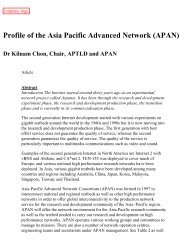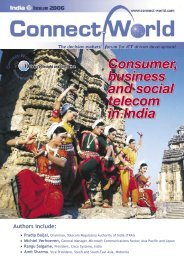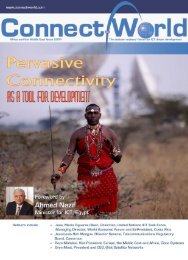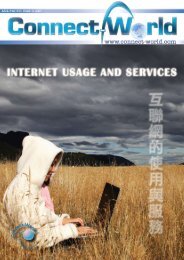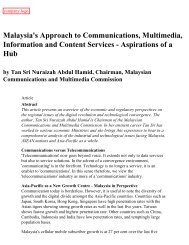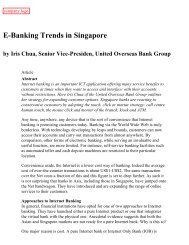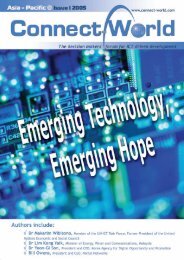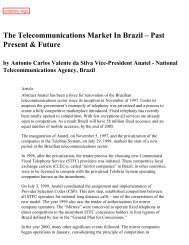Contents - Connect-World
Contents - Connect-World
Contents - Connect-World
You also want an ePaper? Increase the reach of your titles
YUMPU automatically turns print PDFs into web optimized ePapers that Google loves.
Social Development<br />
Socio-economic growth of India in a networked world<br />
by Mukesh Ambani, Chairman and Managing Director, Reliance Infocomm Limited<br />
Information and communications technology will be central to the networked society. It<br />
will not be only a question of hardware. Ubiquitous communications and social networking<br />
software will facilitate the organisation of social interactions and forge new<br />
communities. As wireless moves ahead, it will redefine how government interacts with<br />
citizens and transform the lives of people in remote areas. Networks will reform the<br />
structure of societies and redefine the business landscape. Technology can propel India<br />
to leadership in a networked world.<br />
Mukesh D. Ambani is the Chairman and Managing Director of Reliance Industries Limited, Indias largest<br />
business house and the first and only private sector company from India to feature in the 2004 Fortune<br />
Global 500 list of <strong>World</strong>s Largest Corporations, Mr Ambani is also the Chairman of Indian Petrochemicals<br />
Corporation Ltd. and a Director of Reliance Europe Ltd. Mr Ambani is currently involved in rolling out<br />
Reliance Infocomm Limited — one of the worlds largest and most complex information and communications<br />
technology initiatives. Mr Ambani is the Chairman of the Foundation for the International Federation of<br />
Red Cross and Red Crescent Societies, in Geneva. In India, Mukesh D. Ambani is Chairman of the Board of<br />
Governors of the Dhirubhai Ambani Institute of Information and Communication Technology, and the<br />
Chairman, Board of Trustees of The Indian Institute of Software Engineering. Mr Ambani is a member of<br />
the Prime Ministers Council on Trade and Industry, the Board of Governors of the National Council of<br />
Applied Economic Research; the Council of Scientific and Industrial Research (CSIR); and of the Advisory<br />
Council of the Indian Banks Association. Mr Ambani earned his Bachelor of Chemical Engineering degree<br />
from the University of Bombay and an MBA from Stanford University, USA. Mr Ambani is the recipient of<br />
a great many prestigious national and international awards and honours.<br />
The technological revolution currently<br />
sweeping the globe offers<br />
India an exciting opportunity to<br />
bring about a quantum leap in its<br />
developmental journey. It is now<br />
possible for India to join the ranks of<br />
great powers within the span of our<br />
generation.<br />
Technological breakthroughs now<br />
make it possible to banish poverty,<br />
illiteracy and malnutrition from the<br />
lives of all our people. Opportunities<br />
to make all this a reality are knocking<br />
at our doors because we are moving<br />
to a networked world. In such a<br />
world, there will be new forms and<br />
formats of living. This will impact<br />
not just on society, but also business<br />
and polity. Technology will pull<br />
down geographical and political barriers<br />
and close the gaps of time and<br />
space.<br />
Technology will be central to the networked<br />
society. Within technology,<br />
information technology and communications<br />
will be the key. This is simply<br />
because networked societies<br />
depend on the flow of information.<br />
Here again two technologies will play<br />
a key role — the Internet and wireless<br />
communication.<br />
The Internet will be more about connecting<br />
people to people than connecting<br />
people to portals and websites.<br />
It will take the form of a network<br />
of identities and relationships<br />
that transcend corporate or national<br />
affiliations.<br />
On one plane, the creation of new<br />
communities will come about by<br />
associations of shared interests and<br />
goals brought together in the virtual<br />
world. On another plane, new social<br />
networking software would be in<br />
vogue.<br />
Social networking software will mine<br />
web traffic and look for new relationships<br />
to acquire customers. They<br />
would also help analyse patterns of<br />
behaviour among existing communities<br />
to help improve the value of relationships<br />
through, for example, higher<br />
sales. Social networking software<br />
would also optimise the organisation<br />
of social interactions. This could<br />
take the form of shared purchases<br />
and unified articulation of issues.<br />
Globalisation will induce greater collaboration<br />
across borders. The pressure<br />
to increase efficiency and productivity<br />
will force companies to collaborate<br />
like never before. In manufacturing,<br />
different components of<br />
the production process will be located<br />
in different places of competitive<br />
advantage. Such forms of collaborative<br />
manufacturing would spread to<br />
every other sector.<br />
In research, an explosion of knowledge<br />
and greater specialisation will<br />
force science-based collaboration. In<br />
business, a move towards standard<br />
common business processes will<br />
improve efficiency and productivity.<br />
In new initiatives, increasing risks<br />
will entail strategic alliances for risk<br />
mitigation.<br />
New lifestyles will change social<br />
organisation. Family systems will<br />
face the challenge of accommodating<br />
diversity of aspirations.<br />
Migration of professionals within the<br />
country and across borders will create<br />
new nodes for social organisation<br />
in alien territories. Extended life<br />
6



